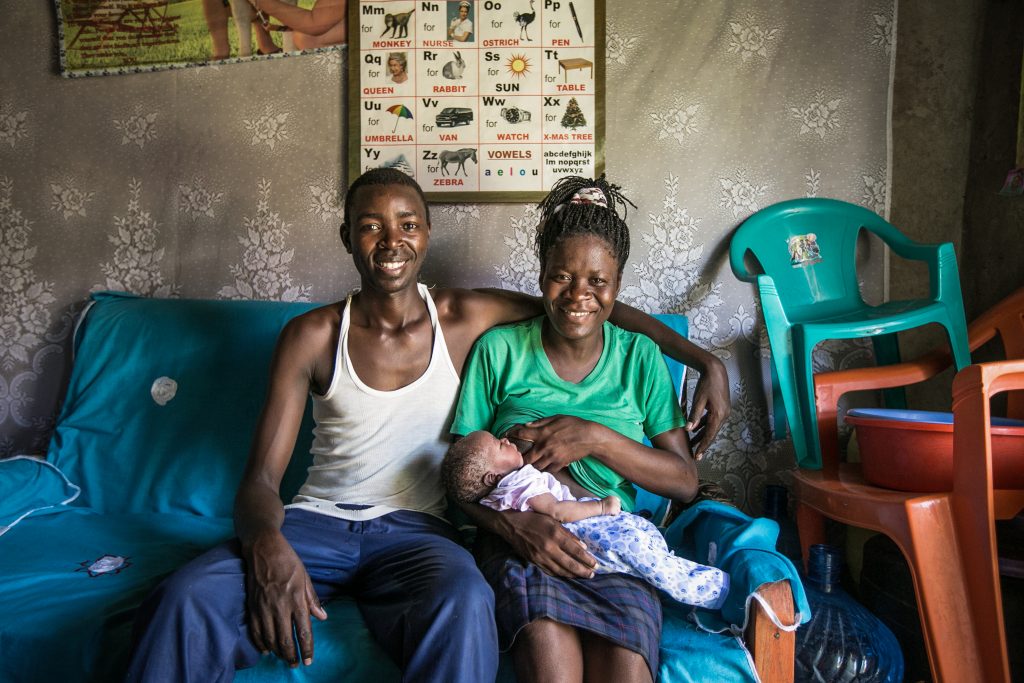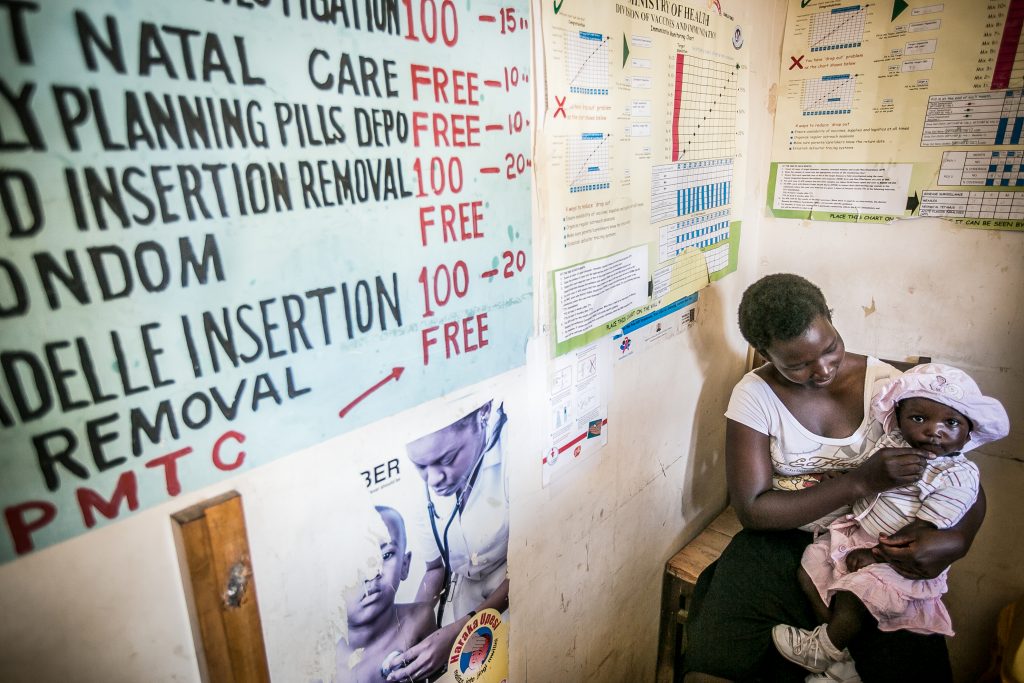Family Planning Decision Support Scientific Priority Area
 The Challenge
The Challenge
Many women face significant barriers in accessing family planning services to meet their reproductive health needs. As a result, unintended pregnancy rates remain high and more than 220 million women worldwide continue to face an unmet need for contraception and family planning support.
Our Response
We develop and test innovative strategies using an implementation science framework to achieve sustainable progress in family planning. We strive to evaluate novel counseling tools and the success of transferable patient-centered care delivery models. These changes will support women and their families make informed reproductive health decisions, and provide access to respectful and dignified family planning care.
Areas of Focus
Novel Family Planning Support Methods
Health support technologies and novel data collection tools will bring the health care system closer to women and their families, bring their health concerns to the attention of decision-makers, and reduce the unmet need for family planning.
Collaboration and Leadership Training
By establishing and growing collaborations, we will responsibly scale and integrate these solutions to help women and their families, expand to other regions and populations and cultivate young innovators to ensure the sustainability of this work. Our passion for encouraging young Family Planning (FP) and Maternal-Child Health (MCH) researchers has led to the development of projects that bring family planning and contraceptive information and support to women and their partners, provide daily support to women and newborns during the critical postpartum period, and understand adolescent needs for contraception.
Implementation Science
Our implementation science framework for family planning and maternal health focuses on person-centered, novel approaches to reaching women. We design tools and improve health systems to empower and support women through family planning, pregnancy, and the postpartum period.

Collaborators
Faculty Directors



MPH, PhD
Assistant Professor
Global Health and Epidemiology [Adjunct]

MD
Professor
Obstetrics & Gynecology and Global Health [Adjunct]
Faculty Leads and Technical Advisors


MD, MPH
Associate Professor
Obstetrics & Gynecology

MD, MPH
Acting Assistant Professor
Obstetrics & Gynecology

MPH, PhD
Associate Professor
Global Health and Epidemiology


MBChB, MMed, MPH
Head of Research and Programs
Kenyatta National Hospital;
Affiliate Associate Professor
Global Health

PhD
Assistant Professor
Global Health

MD, MSc
Associate Professor
Global Health and Epidemiology
Staff and Trainees

MPH Student
Epidemiology
PhD Student
Global Health Implementation Science

MPH
Research Coordinator

Research Studies
Our projects often provide opportunities for University of Washington graduate students to assist in data analysis. Please contact the Principal Investigator to inquire about currently available opportunities or anticipated needs in the near future.
Leveraging the Mobile WACh Hybrid-Computer Platform to Increase Uptake of MCH and FP Strategies
Solutions for Women and Children's Health in Kenya (Mobile WACh)
This randomized trial was designed to determine the effect of a systematic provision of tailored one-way SMS or two-way SMS dialogue on uptake of maternal-child health (MCH) strategies including facility delivery, antenatal care attendance, infant immunizations, exclusive breastfeeding, and postpartum family planning uptake. We utilized a novel human-computer hybrid approach to deliver messaging to women targeted at increasing uptake of MCH and FP strategies.
Sponsor: National Institutes for Health (K12HD001264)
Award Years: 07/01/2013 – 07/01/2015
Principal Investigator: Jennifer Unger
Co-Investigators: Elizabeth Harrington, John Kinuthia
Communication Empowering Mothers and Newborns (Mobile WACh NEO)
This randomized trial was designed to determine the effect of a systematic provision of tailored one-way SMS or two-way SMS dialogue on uptake of MCH strategies including facility delivery, antenatal care attendance, infant immunizations, exclusive breastfeeding, and postpartum family planning uptake. We utilized a novel human-computer hybrid approach to deliver messaging to women targeted at increasing uptake of MCH and FP strategies.
Sponsor: United States Agency for International Development (AID-OAA-F-16-00026)
Award Years: 07/01/2016 – 06/30/2019
Principal Investigators: Jennifer Unger, John Kinuthia
Co-Investigators: Maneesh Batra, Alison Drake, Grace John-Stewart, Keshet Ronen
Mobile Solutions for Neonatal Health and Maternal Support (Mobile WACh NEO RCT)
This randomized control trial will evaluate the novel Mobile WACh NEO intervention to address a crucial gap in supporting mothers to care for their neonates and seek care when needed and has the potential to make a significant contribution to the World Health Organization’s Every Newborn Action Plan to end preventable neonatal death and stillbirth.
Sponsor: National Institute for Health Child Health & Human Development (5R01HD098105)
Award Years: 06/01/2019 – 03/31/2024
Principal Investigators: Jennifer Unger, John Kinuthia
Co-Investigators: Maneesh Batra, Grace John-Stewart, Barbra Richardson, Keshet Ronen, Manasi Kumar (University of Nairobi), Dalton Wamalwa (University of Nairobi)
Evaluation of mHealth Strategies to Optimize Adherence and Efficacy of PMTCT/ART (Mobile WACh X)
This randomized trial was designed to determine the effect of a systematic provision of tailored one-way SMS or two-way SMS dialogue to control virologic suppression in HIV-infected peripartum women in Kenya.
Sponsor: National Institute for Health Child Health & Human Development (5R01HD090460)
Award Years: 05/01/2014 – 04/30/2021
Principal Investigators: Grace John-Stewart, John Kinuthia
Co-Investigators: Keshet Ronen, Jennifer Unger
Evaluation of an mHealth SMS Dialogue Strategy to Meet Women's and Couples' Postpartum Contraceptive Needs in Kenya (Mobile WACh XY)
Mobile WACh XY is a two-arm randomized controlled trial (RCT) comparing the effect of bidirectional SMS dialogue vs. control on highly effective contraceptive use at 6 months postpartum among individual women and couples in Nyanza Province, Kenya. Data from this RCT and accompanying qualitative study will contribute to innovative, scale-able strategies to address unmet need for contraception and increase male involvement in family planning. Mobile WACh XY differentiates itself in the family planning arena by including an emphasis on male partner involvement and couple communication.
Sponsor: National Institutes of Health
Award Years: 2016 – 2021
Principal Investigators: Elizabeth Harrington
Co-Investigators: John Kinuthia, Jennifer Unger
A SMS-based Support Intervention to Enhance PrEP Adherence during Pregnancy and Breastfeeding (mWACh-PrEP)
We propose a randomized trial to determine the effect of the mWACh-PrEP tool on PrEP adherence during pregnancy through the postpartum period. We will also gather data on cost and delivery using the Proctor Implementation Outcomes Framework to expedite translation into routine practice. Our overarching hypothesis is that mWACh-PrEP will improve PrEP adherence among mothers at-risk for HIV, be acceptable to patients and providers, and be cost-effective.
Sponsor: National Institute of Nursing Research (5R05NR019220)
Award Years: 09/18/2020 – 06/30/2025
Principal Investigators: John-Kinuthia, Jillian Pintye
Mobile solutions to empower reproductive life planning for women living with HIV (Mobile WACh Empower)
We will evaluate an SMS platform and reproductive health counseling intervention designed to provide reproductive life counseling and integrated reproductive health/HIV services in a cluster randomized controlled trial among women receiving routine HIV care, and plan for future implementation with qualitative and health economic analyses.
Sponsor: National Institute of Health (R01HD104551)
Award Years: 06/01/2021 – 05/31/2026
Principal Investigator: Alison Drake
Co-Investigators: John Kinuthia, Jennifer Unger, Rena Patel, Barbra Richardson, Kristin Beima-Sofie, Monisha Sharma
Community-based digital communication to support neonatal health (CHV-NEO)
This study will develop an interactive SMS text messaging intervention that remotely connects mothers with community health volunteers (CHVs), and evaluate the intervention’s effect on clinical outcomes (neonatal mortality, facility visits, and essential newborn care), service outcomes (CHV and supervisor workflow), and implementation outcomes (acceptability, uptake, and fidelity of implementation) when implemented as part of routine CHV workflow in Kenya.
Sponsor: National Institute of Health (5R05NR019220)
Award Years: 04/15/2021 – 02/28/2026
Principal Investigator: Keshet Ronen
Co-Investigators: John Kinuthia, Isaac Holeman
Utilizing Tools to Develop New Interventions
Mobile Collection of Contraceptive Use, Behaviors, and Experiences in Western Region, Kenya (mCUBE)
The goal of this study is to develop a deeper understanding of contraceptive behavior, including adherence, experiences of side effects, continuation, and satisfaction, among a cohort of adult women and adolescent girls using modern contraception in western Kenya. We test the feasibility and acceptability of a novel, tailored mobile messaging platform for collecting real-time, ongoing information from women on their family planning experiences.
Sponsor: Gates Grand Challenges Award (OPP1172004)
Award Years: 05/01/2017 – 10/31/2018
Principal Investigator: Alison Drake
Social Media Support for Peripartum Adolescents in Seattle (IMAGINE)
We propose to develop a social media-based group counseling intervention to prevent perinatal depression in adolescents, based on core elements of the MBP curriculum. Leveraging our interdisciplinary collaborative team’s experiences designing and evaluating social media interventions, and providing mental health care to peripartum women and adolescents.
Sponsor: University of Wisconsin Technology and Adolescent Mental Wellness (TAM)
Award Period: 06/01/2019 – 06/01/2021
Principal Investigator: Keshet Ronen
Co-Investigators: Amritha Bhat, Jennifer Unger
[/section]
Improving accuracy in measurement of fertility intentions and delivery of reproductive life planning counseling
The University of Washington (UW) and Women and Infant’s Hospital (WIH)/ Brown University team proposes to develop a novel, person-centered, locally derived, comprehensive psychometric scale to improve the accuracy of fertility intentions measurement and utilize the novel scale to refine a reproductive life planning digital counseling tool. Accurate estimates of current fertility intentions are critical to provide appropriate reproductive life counseling to individual women and monitor programmatic success of family planning (FP) programs. Misclassifying a woman’s need for pregnancy prevention may under- or over-estimate gaps in meeting their reproductive health (RH) needs, particularly contraceptive needs, and may lead to coercive provider behaviors and patient misunderstanding and mistrust.
Sponsor: Bill & Melinda Gates Foundation
Award Period: 09/03/2022 – 08/31/2024
Principal Investigator: Alison Drake
Developing a novel psychometric survey to prospectively measure pregnancy intention among adolescent girls and young women in Kenya
We propose to develop a novel comprehensive psychometric survey to prospectively measure the pregnancy intentions among AGYW in Kenya. We will generate an item pool of potential survey items based on literature review of existing scales to measure current pregnancy intentions and conduct in-depth interviews (IDI) with AGYW. Themes emerging from IDIs will be utilized to develop the survey, which will be piloted with AGYW in the same sites, and further refined. The scale will be validated using item response theory with Rasch model for binary items and Rating Scale model for ordinal items. This new psychometric survey has the potential to accurately assess current fertility intentions and support tailored reproductive life counseling and decision-support for AGYW for evaluation in a larger future trial.
Sponsor: UW Royalty Research Fund
Award Period: 04/01/2023 – 03/31/2024
Principal Investigator: Alison Drake